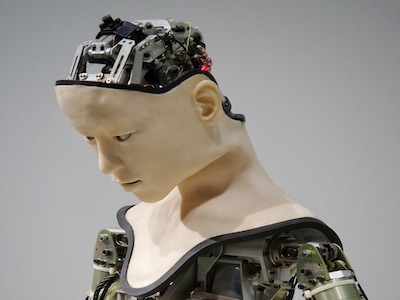About C-STES
Our Mission
The mission of C-STES is to produce interdisciplinary knowledge and critical thinking about the ethical, social, and policy dimensions of science, technology, and medicine.

Robot used in artificial intelligence research
Goals:
- To facilitate interdisciplinary research collaborations among faculty and students, particularly on the ways that science, technology and medicine impact rural communities and populations.
- To cultivate ethical thinking and behavior in research.
- To expand and enhance engagement between researchers and the public in ways that benefit all stakeholders.
Research Areas:
C-STES is currently pursuing six areas of research focus.
AI/Machine Learning

Central issues
- What are the potential social implications of relying on AI, machine learning and algorithms?
- How do these technologies impact different social groups?
- What are the ethical responsibilities of engineers and programmers?
- Do these technologies change or transform what it means to be "intelligent" or human?
Internet & Data Ethics

Central issues
- Who "owns" data?
- How can we address concerns about privacy, confidentiality, and identity theft?
- Should data or the way data is compiled be more transparent?
- How can we protect against cyber attacks or failures?
- What are the positive and negative impacts of internet technologies and social media?
Sustainability & Justice

Central issues
- How are different populations impacted by environmental issues differently?
- How can agricultural and water technologies be developed and implemented in ways that address the needs of all?
- How can technology be harnessed to produce alternative energy and sustainable materials in ways that benefit everyone?
Rural Health

Central issues:
- What are the central health threats different rural communities and populations face?
- What are the challenges faced by rural communities in having access to high quality and affordable healthcare?
- How can technology and new medical interventions address these challenges?
- How can we best combat health inequalities?
Biotechnologies

Central issues:
- What are the potential promising applications of gene editing and engineering technologies?
- How can such technologies result in better clinical health outcomes?
- How can such technologies be used in agriculture, material sciences, or other interdisciplinary fields?
- What are the potential risks or consequences of using such technologies and how can risks be minimized?
STEM Workforce Development and Access

Central issues:
- What are the areas where future STEM workforce will be needed to address U.S. needs?
- What are the best practices for developing and cultivating that workforce?
- What are the challenges (especially for rural students) and how can we best overcome these challenges?
- How can we design technology in ways that increase access for everyone?
People & Partners


